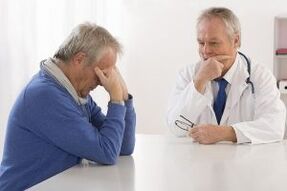According to statistics, about one-third of men in their thirties have prostatitis, and nearly half of men after fifty.

Maybe the actual situation is different because there is asymptomatic prostatitis (chronic form). Another problem is that many people are just shy or afraid to report their symptoms to the doctor.
The prostate is a very important organ in the male body: it is responsible for producing special secrets that mix with semen and maintain normal and healthy sperm activity, as well as the sperm's resistance to negative facts and conditions.
Prostatitis symptoms in men
What are the symptoms of male prostatitis? Common signs of male prostatitis:
- Performance issues.
- The development of neurological diseases.
- Illness.
- Pain in the perineum, groin and pubic area is short-term and will pass quickly.
- Urine discharged from the urethra (most commonly in the morning) looks like a white flake.
Below you will find information about the symptoms of male prostatitis.
More information about each
What is the manifestation of prostatitis in men? The first sign of prostate inflammation in men is frequent urination.
Increased desire to urinate at night and during the day. Urinating is accompanied by pain in the lower abdomen ("like a cut"). Not only can the painful sensation appear during urination, but it can also become chronic. Frequent urination accompanied by pain often indicates chronic prostatitis.
The manifestations of male prostatitis include a feeling of constant filling of the bladder.
After finishing the action, still feel that the bladder is still full. Increase irritability and self-doubt. It can occur in two forms of disease development. Need to seek medical help, because the extreme development of this symptom is retention of urine in prostatitis.

Prostatitis in the urine is a rare symptom. May point to:
- The development of purulent and inflammatory processes;
- means trauma;
- For comorbid prostatitis-hyperplasia (another disease characterized by an increase in the number of tissue structural elements and excessive cell formation, requiring separate treatment).
Increased fatigue is the result of the disease. First of all, in the absence of treatment, the body can make up for the disease on its own, which is reflected in mental resources.
may increase irritability, fatigue and depression.
It develops more frequently in a chronic form.
Pain in the perineum and scrotum.
If not processed, increase. It develops in chronic and acute forms.
Sexual dysfunction. The erection deteriorated and "faded", and the time of intercourse was significantly reduced. The spontaneous morning erection also disappeared. This is an indirect sign, and more often it indicates a chronic form.
Difficulty defecation-the rectum may be painful during defecation and pus may be discharged. Talk about an acute form.
Excessive sweating indicates that the disease is chronic. Perineal area often sweats. It may occur "together" with mood disorders (the result of anxiety and psychological factors).
Prostatitis is also a symptom. How to recognize prostatitis? If you find similar symptoms, it is best to contact a specialist who can make the correct diagnosis.
Consider the signs of acute and chronic prostatitis and prostatitis in men.
Acute form
Manifestations of prostatitis in men-symptoms:
- A feeling of general weakness and severe discomfort.
- Body temperature is one of the symptoms of prostatitis, and headaches follow.
- The painful symptoms of prostatitis (perineum) are exacerbated with urination and defecation.
- Going to the toilet often does not bring satisfaction-the bladder cannot be completely empty.
- This in turn increases irritability and nervousness. In clinical situations, acute urinary retention may occur.
Chronic form
Usually, the process is asymptomatic and the person has not actually filed a complaint (or may not have realized it).

The signs of expression of this disease are almost never observed.
If you are not aware of the manifestations and symptoms of prostatitis, despite the prevalence of the disease, it is still considered "shameful".
People who feel unwell and have difficulty urinating may just "not notice" these symptoms without paying the attention they deserve.
PSA levels can be elevated in chronic prostatitis, but not always. In many cases, analysis of men with chronic prostatitis shows that PSA levels are within the normal range. Chronic prostatitis is usually undetected.
Given that chronic prostatitis is a rather slow disease, the immune system can resist the acute inflammatory process.
Since the inflammation has not been completely cured, there is still a continuous inflammatory process in the prostate, which becomes a chronic form, which can lead to scars in the prostate at the inflammation site.
Larger scars can cause prostate dysfunction. Like acute prostatitis, chronic prostatitis can be detected by the following symptoms:
Male prostatitis symptoms (chronic):
- Squeezing and pain in the perineum and genitals.
- Painful ejaculation.
- Pain in the bladder area.
- Pain and burning during or after urination.
- Causes pain and pain in the groin area.
- Increased the desire to urinate.
- Erectile dysfunction.
Clinical manifestations and development
The signs of male prostatitis indicate that a doctor is urgently needed. Which doctor should I see for prostatitis? Read more here.
The inflammatory process leads to narrowing of the urethral lumen and inflammation of the nerve endings, which is manifested as a violation of the urination process (as you know, this usually happens at night, multiple times at night, urination is "a small part", there is no sense of satisfaction, Satisfied with this) The bladder is completely empty).
If started on time, inflammation of the prostate will not cause disease in the genital area. If the inflammatory process has developed to a sufficient degree: libido is suppressed, infertility may develop, the risk of secondary urinary tract infections increases, and chronic renal failure may develop.
What else can performance talk about?
Sexual dysfunction is a single symptom, or accompanied by sweating, which may be a symptom of a neurological disease. For example, chronic stress.

Some of our diseases do come from nerves.
By the way, sexual dysfunction usually has a neurological basis, and its cause is psychological.
In this case, you need to consult a psychologist or psychotherapist, usually more than once.
It’s important to know: If we talk about sexual dysfunction in neurological terms, we should keep in mind that in this case, there will be no inflammation or fever, and no secretions will be observed.
The diagnosis should start with the doctor. Of course, when sexual dysfunction is the only symptom, you should see a psychologist first (even so, it is recommended that you apply for necessary tests and see a doctor).
The doctor can confirm a definite diagnosis only after the examination and the necessary examinations are passed. First, the presence of secretions or inflammation indicates a sexually transmitted disease.
All these diseases can only be distinguished by clinical blood tests and smear results. For each disease, you can establish your own drug treatment program (for example, a course of antibiotics).
Who should I contact?
How to check for prostatitis? The examination should start with the urologist and andrologist.
During the recovery period (after the main treatment), it is recommended to go to a physical therapist, physical therapist and psychologist to restore the patient's mental state to normal.
You should listen carefully to expert advice, and if you have a prescription, please follow it strictly. Don't forget that appropriate precautions will be taken after the treatment is over.
Conclusion
Now you know what the symptoms of male prostatitis are. It is recommended to avoid hypothermia, not to be bothered by spicy and fried foods, tobacco, alcohol, and smoking, and to have regular sex. Don't forget to prevent sexually transmitted diseases (first, you should be protected).
Follow the doctor's advice. If it is not a healthy lifestyle, try to guide yourself, at least not to be harmful, and not to abuse harmful substances (smoking, drinking). Don't hesitate to report your complaint to the doctor. If your loved one is sick, please provide emotional support.






























